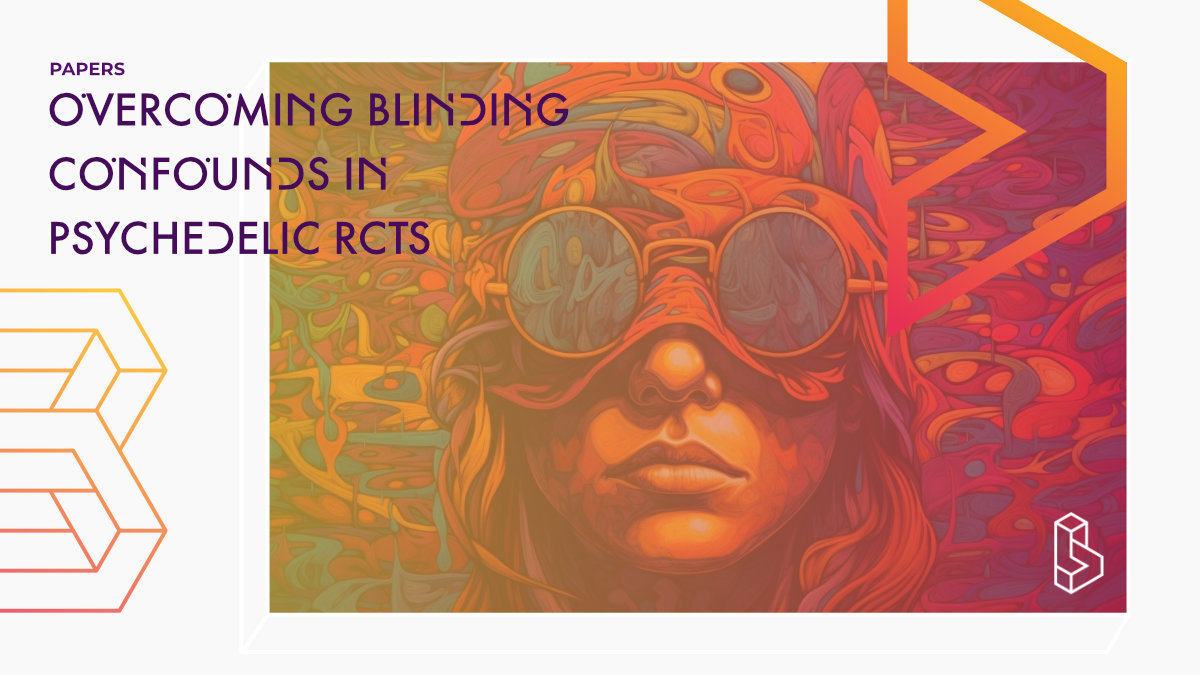This commentary (2023) suggests that causal mediation analysis using objective biomarkers could help establish causal pathways between treatment and outcome, providing greater confidence in the efficacy of psychedelic therapies before they are approved as regular medicines. This cautious approach is recommended to avoid potential drawbacks such as expanding indications based on low-quality evidence and unstable efficacy over time.
Abstract of Overcoming blinding confounds in psychedelic RCTs
“There is great interest in the use of psychedelic-assisted therapies to treat a range of mental health conditions and initial randomized controlled trials (RCTs) trials have generated positive results. However, the effect sizes reported in psychedelic RCTs are likely inflated due to expectancy effects due to the de-blinding of both participants and study personnel to treatment allocation caused by the distinctive psychoactive effects of psychedelic drugs. In this article an introduction to causal inference for randomized controlled trials, the underlying assumptions, and potential confounders along with graphical illustrations is provided. It is proposed that causal mediation analysis using objectively measured mediating biomarkers could be used to identify causal pathways between treatment and outcome in psychedelic RCTs, even with de-blinding of participants and give greater confidence as to the mechanistic basis and efficacy of psychedelic therapies. It is argued that psychedelic therapies should not be approved as regular medicines until causal pathways are clearly established between treatment and outcome. Potential downsides of doing so include, future indication expansion based on low quality clinical trial evidence, the approval of other therapies based on similarly low-quality evidence, and the potential for efficacy to be unstable over time after approval.”
Author: Suresh D. Muthukumaraswamy
Summary of Overcoming blinding confounds in psychedelic RCTs
There is considerable scientific, public and commercial interest in the potential for psychedelic drugs to be used medically in treating various disorders, including major depressive disorder, depression, post-traumatic stress disorder and anxiety disorders.
Despite advancements in treatment, estimates of treatment effect sizes in randomized controlled trials are confounded by de-blinding. An alternative approach is proposed that links treatment and outcome via an objectively measured biological mediator. The article begins by introducing the Neyman-Rubin potential outcomes framework for causal inference and then considers how various methodological confounds in psychedelic RCTs violate the framework’s assumptions. A potential solution to the de-blinding issues in psychedelic RCTs problem is proposed by using objectively measured biomarkers.
Find this paper
https://doi.org/10.31234/osf.io/d52ay
Open Access | Google Scholar | Backup | 🕊
Cite this paper (APA)
Muthukumaraswamy, S. (2023, June 13). Overcoming blinding confounds in psychedelic randomized controlled trials using biomarker driven causal mediation analysis. https://doi.org/10.31234/osf.io/d52ay
Study details
Authors
Authors associated with this publication with profiles on Blossom
Suresh MuthukumaraswamySuresh Muthukumaraswamy (Ph.D.) is a Principal Investigator in the Centre for Brain Research and the Auckland Neuropsychopharmacology Research Group. His main research interests are in understanding how therapies alter brain activity and in developing methodologies to measure these changes in both healthy individuals and patient groups. His previous studies investigated a range of compounds including hallucinogens (ketamine, LSD, psilocybin), anesthetics, anti-epileptics, and GABA-enhancers using a wide range of neuroimaging techniques. His current work investigates ketamine and midazolam using simultaneous EEG/fMRI recordings, and the effects of ketamine, scopolamine, and rTMS in depression.
Linked Research Papers
Notable research papers that build on or are influenced by this paper
Blinding and Expectancy Confounds in Psychedelic Randomised Controlled TrialsThis systematic review (2021) argues that de-blinding (breaking blind) in randomized controlled trials (RCTs) of psychedelic therapies is leading to a (not defined/measurable) over-estimation of the outcomes (outside clinical trials). The authors suggest measures to tackle this and to use caution interpreting the existing RCTs.

